- Home
- Chris Pierson
Chosen of the Gods k-1
Chosen of the Gods k-1 Read online
Chosen of the Gods
( Kingpriest - 1 )
Chris Pierson
Chris Pierson
Chosen of the Gods
Prologue
Eleventhmonth, 922 IA
The Lordcity of Istar was the center of the world around which A all else revolved. Capital of an empire vaster than any other Krynn had ever known, it sat upon the shores of the sapphire lake that shared its name, its high, white walls encircling it like a mother’s arms. Half a million souls-more than mighty Palanthas and Tarsis to the west combined-dwelt within that embrace. It outmatched other cities not only in size, however, but also with splendor. There was a legend that the great statues that stood atop its gilded gates had wept at the city’s beauty when they were first raised, though they were crafted of solid marble.
Everywhere one looked in the Lordcity, there were wonders to behold. Vast manors and churches lined its wide, tree-lined streets, roofed with domes of gold and alabaster, and smaller buildings gleamed in the light of sun and moons alike. Broad plazas held gardens where a thousand different colors of flowers bloomed, and fountains sent water spraying high into the air, to glitter like diamonds as it plunged back to earth. Silken sails filled its harbors, overlooked by the God’s Eyes, twin towers where beacons of polished silver blazed day and night. Idols of the gods of light stood watch from the city’s heights, more than ten men tall, hewn of lapis and serpentine, sard and chalcedony. Its marketplace bustled with noise and laughter and a riot of trade riches: spices and satin, wine and pearls, brightly hued songbirds and the skulls of long-dead dragons.
Even in such a marvelous city, some wonders stood out. In the western quarter was the School of the Games, a vast arena draped in banners of silk, where gladiators had once fought and died and mummers now played out tales of wars long won, kingdoms long since conquered. In the north stood the Keep of the Kingfisher, a huge, strong-walled fortress that served as headquarters for the Solamnic Knights within the empire. To the east, high above the domes and treetops, surrounded by an enchanted grove of olive trees, rose the crimson-turreted Tower of High Sorcery, where the wizards dwelt.
All of these, however, were nothing beside the Great Temple. Sitting in the Lordcity’s midst, the marble-paved streets radiating out from it like a wheel’s spokes-or a spider’s web, some said-the Temple was the most resplendent edifice ever built. Those travelers lucky enough to have seen the halls of the elven kings spoke of them as mere shadows of the Temple’s glory. A wide plaza, the Barigon, surrounded it, large enough that nearly every soul in the Lordcity could stand within it and look upon its graceful, buttressed walls and seven golden spires that reached up like fingers clutching at the heavens. Within, amid lush gardens and pools filled with jewel-hued fish, stood more than a dozen buildings, each more glorious than the last. Among them were the entrance hall, itself larger than most cities’ cathedrals, and the towering, silver-roofed cloisters where the clergy resided. The imperial manse, where the Kingpriest dwelt, surpassed even these, and at the eye of the Temple was the true heart of the city, the center of the world. There, grandest of all, was the basilica, a vast dome of frosted crystal that shone with its own holy light, like a star plucked from the heavens and set upon the earth.
This night First Son Kurnos glowered at the basilica from the steps of his cloister. A stocky, powerfully built man with thinning red hair and a bushy beard frosted with silver, he was the head of the Revered Sons of Paladine, the most powerful of all the world’s orders, and adviser to the Kingpriest himself. He was also shivering with cold. The sky was dark, and though a month still remained until autumn’s end, snow danced in the air above the Temple. It dusted the paths of crushed crystal that wound through the church’s grounds and lit on the moonstone monuments of the Garden of Martyrs, which bore the names of those who had died serving the church. It was a rare thing- the Lordcity’s winters were known for rain, not snow-and another time, Kurnos might have found it beautiful. Now, however, his thoughts were elsewhere.
“Quickly, boy,” he growled, cuffing the ear of the acolyte who stood beside him. “I haven’t got till sunrise.”
The younger priest, clad in a gray habit that seemed all the plainer beside Kurnos’s embroidered white robes, hurried past, down to the garden path. The same lad had woken Kurnos half an hour ago and given him the missive. It had come in a tube of platinum, inlaid with amethysts: a single sheet of vellum, scented with rosewater. Its seal was azure wax, bearing the triangle-and-falcon signet of the Kingpriest. It bore only Kurnos’s name and three words in blue ink, written in the church tongue: Tarn fas ilaneis.
Thou art summoned.
Kurnos felt uneasy. He had been First Son for five years and a lesser member of the imperial court for another ten before that. In that time, he had received numerous imperial summonses-but never in the middle of the night. Never, not even once, written in the Kingpriest’s own hand.
Before him, the acolyte raised his hands to the cloud-heavy sky. He began to speak softly. “Cie nicas supam torco,” he murmured, “Palado, mas doboram burtud.”
Though I walk through night’s heart, Paladine, be thou my light.
As he finished the orison, a soft glow, as of silver moonlight, rose around him. The First Son felt a twinge of jealousy. The boy’s powers were minor but more than most priests could wield-Kurnos among them. In ancient times, when evil was rampant in the world, the clergy’s holy might had been vast. In Holy Istar, however, centuries of holy war had left the forces of darkness weak and scattered, and the power to work miracles had dwindled along with the need for them. The god, the church’s doctrine taught, was sparing with his gifts.
“The way is ready, Aulforo,” murmured the acolyte.
Kurnos nodded, stepping out into the magical moonlight. “Go,” he said, waving the boy away.
The acolyte retreated into the cloister as he set forth across the garden, past the graven monuments. The moonlight followed him over ornamental bridges and up marble steps, past almond and lemon trees, where nightingales sang. He turned aside from the basilica, making instead for the imperial manse. A pair of Solamnic Knights stood guard outside, clad in polished, antique armor; they dipped their halberds as he approached and stepped aside without a word.
The manse’s doors were huge, made of beaten platinum. They swung open silently as he approached and stepped through into the vestibule. The entry hall, like everything in the King-priest’s private residence, was richly appointed, with the finest furnishings from the empire’s many provinces: mahogany panels from the jungles of Falthana on the walls; gold-threaded arrases from sun-drenched Gather; carpets woven by the desert-dwelling folk of Dravinaar. Columns, crowned with rose-petal capitals, ran down its length, and in its midst stood seven onyx pedestals, bearing alabaster statues of the gods of light.
Paladine, the supreme god of Good, loomed above the others, a long-bearded warrior in armor shaped like dragon-scales. Kurnos genuflected to the idol, kissing the platinum medallion that hung at his throat then pressing it to the god’s glistening feet.
A door opened as he knelt there, and an old, bald cleric in a white cassock emerged. Kurnos recognized the man: Brother Purvis, the Kingpriest’s chamberlain. His eyes were bleary as he bowed to the First Son.
“Your Grace,” he said. “You are expected.”
Kurnos rose without reply and handed the old man his fur-lined cloak. Together they walked down a broad, marble hall and up a stairway to a door of polished silver. It opened at Purvis’s touch, and the chamberlain stepped aside to reveal a well-appointed waiting room.
“Revered Son,” said a gentle voice.
Loralon, Emissary for the elves of Silvanesti, rose from a cushioned seat on the room
’s far side. As he did, he signed the sacred triangle-one palm atop the other, thumbs extended to a point beneath-that was the holy sign of Kurnos’s order. It was a courtesy, for the Silvanesti took the pine tree, not the triangle, as their gesture of blessing. Kurnos nodded in reply, stepping forward as Purvis shut the door behind him.
The elf gestured toward another chair, and Kurnos sat, regarding him carefully. Loralon was as always: calm, reserved, eyes sparkling in the glow of the lamps that lit the room. He was old, even for his long-lived people, having seen more than five hundred years. Though his face remained unlined by age, his hair had turned silver, and a snowy beard-rare among the elves, found only among the most ancient-trailed down his chest He was clad in full raiment, from the golden circlet on his head to the jeweled slippers upon his feet. He looked neither tired nor annoyed, and Kurnos wondered, not for the first time, if the elf ever slept.
They exchanged pleasantries, then sat in silence for a while, sipping from jeweled goblets of watered claret, mixed with spices from Karthay. In time Purvis returned, leading a tall woman, whose long, raven-black hair was pulled back into a severe bun that made her look older than her forty years. She wore robes of pearly satin trimmed with lavender and silver jewelry at her ears, wrists, and throat. Her dark eyes swept the room.
“It seems,” she declared, signing the triangle as Loralon and Kurnos rose, “that I’m the last to arrive.”
“First Daughter,” the elf said, smiling kindly. “You were always the deep sleeper.”
Ilista, leader of the Revered Daughters of Paladine- companion order to Kurnos’s own^folded her arms. “What is this about?” she asked. “Is something wrong?”
Kurnos and Loralon exchanged tight-lipped glances.
“I think it likely,” the elf replied, “but as to why His Holiness has called us here at this hour, milady, I fear neither of us know any better than you.”
Purvis stood aside while the Kingpriest’s advisers greeted one another. Now he stepped forward, making his way to a pair of gold-chased doors at the room’s far end. Engraved upon them was the imperial falcon and triangle-the one, symbol for the empire, the other for the god. The doors opened at his touch, letting white, crystalline light spill through; then he turned to face the three clerics, bowing low.
“His Holiness bids you welcome,” the chamberlain intoned. “Gomudo, laudo, e lupudo.”
Enter, behold, and adore.
The audience chamber was smaller than the great throne room that occupied most of the basilica, but it was still far more opulent than those of other sovereigns. It brought gasps from those beholding it for the first time, but to Kurnos it was a familiar place. He scarcely noticed the mosaic of interwoven dragon wings that covered the floor, the strands of glowing diamonds that hung from the ceiling, the platinum triangles and lapis falcons that adorned its walls. Instead, his gaze went directly to the marble dais at the far end, beneath a violet rose window. Atop the platform stood a golden throne, wreathed with white roses and flanked by censers of electrum that gave off tendrils of pale smoke. His eyes slid past these, focusing at last on the man on the satin-cushioned seat.
Symeon IV, Kingpriest of Istar, Paladine’s Voice on Rrynn, was not a physically imposing man. Nearly sixty years old, he was small and plump, pink-cheeked and beardless. At first glance, he looked almost like a child, though there was sharpness in his black eyes that left no doubt he was the most powerful man in all Ansalon. Many men, expecting him to behave in the manner of a eunuch, had quailed and broken before that unrelenting gaze. His golden, jeweled breastplate and the sapphire-studded tiara on his brow gleamed in the white light. He raised a hand that sparkled with precious stones.
“Apofudo, usas farnas” he said, beckoning.
Come forward, children of the god.
Obediently, Kurnos moved to the dais with the others and mounted the first step. They bowed their heads as the King-priest signed the triangle over them, murmuring a soft benediction. Symeon sat back, smoothing his silvery robes.
“You have questions,” the Kingpriest said. “Here is my answer. I have called you here because the time of my death is near.”
Kurnos started, surprised. Beside him, Loralon’s brow furrowed, and Dista’s eyes widened.
“Sire?” the First Daughter blurted.
Symeon was a hard man-not cruel, but distant. All knew that while Istar honored him, there was little love for the King-priest among the common folk of the land. His midnight eyes glinted, and Dista looked away, unable to meet his stare.
“Holiness,” Loralon ventured, drawing Symeon’s gaze away from the First Daughter. “How can you know this? Has something happened?”
“Yes,” the Kingpriest replied. “Something has. Tonight, as I was reciting my midwatch prayers before taking to my bed, a visitor came to my chambers. A dragon.”
“What?” Kurnos said, and all at once the imperious glare was on him. He weathered it, though he could feel his face redden. “Pardon, Holiness, but there are no dragons left in the world. All know that Huma Dragonbane banished the wyrms of evil a millennium ago, and Paladine himself bade the good dragons leave soon after.”
“I know the history, Kurnos,” the Kingpriest declared coldly. “Nevertheless, the dragon was here. Its scales shone like platinum in sunlight, and its eyes were diamonds afire. It spoke to me, in a voice of honey and harpstrings. I knew at once it was Paladine himself, taken flesh.
“ ‘Symeon,’ said the dragon, ‘most beloved of my children. Within a twelvemonth, I will call you to uncrown. From that day, you shall dwell evermore at my side.’
“And so, my children, I have called you here to share this news. The coming year shall be my last.”
The audience hall was utterly still. Kurnos and Dista stared in shock. Loralon stroked his beard, lost in thought. The rose window made the only sound, hissing as snow pattered against the glass from outside.
Finally, the First Son cleared his throat “How can this be?” he asked. “It’s only seven years since you were crowned, Majesty.”
The Kingpriest nodded. “Yes, but Paladine’s word will not be denied. Soon I shall be with him.”
“There is precedent,” Loralon added. “A century and a half ago, the god appeared to Kingpriest Ardosean I as he lay dying.” The elf regarded Symeon evenly. “You are fortunate, Holiness. Most clerics live their entire lives without beholding such a sight”
“Our luck is as poor as yours is good,” Dista added. “It is hard not to envy Paladine for taking you from us.”
The Kingpriest nodded, accepting the compliment as his due. “There is another reason I have summoned you three here,” he said, his gaze falling upon Kurnos. “If I am to go to the god, I must name my heir.”
For a moment, the First Son blinked, not understanding. Then he saw the way the dark eyes glittered, reflecting the gems of Symeon’s tiara, and he felt his throat tighten. His skin turning cold, Kurnos tried to speak, but his voice failed him. He looked down, unable to meet the imperial gaze any longer.
“Yes, Aulforo,” Symeon said. “It is my wish that you take my place upon the throne. When I am gone, you shall be the next Kingpriest of Istar.”
The rest of the audience passed in a blur. Later, Kurnos dimly remembered the rite of succession that followed the Kingpriest’s pronouncement: a long liturgy by Symeon, to which he responded at the proper times, like a man half-awake. Loralon and Dista both served as witnesses, vowing before Paladine and Symeon alike they would support Kurnos’s rule. Finally, the Kingpriest recited the final “Sifat”-Be it so-and the ritual ended.
After, Purvis escorted the imperial advisers from the audience hall, then out of the manse and back into the night. Loralon and Dista took their leave, returning to their quarters to find some rest before the new day. Kurnos didn’t retire, however- sleep was the furthest thing from his mind. Instead, he lingered in the Temple’s gardens, wandering the snowy paths about the gleaming basilica. This time he hardly noticed the chill i
n the air, and he also took no notice of the monks and knights who passed him as he walked. His mind roiled, the thoughts coming back and back again to the same four words:
I will be Kingpriest.
It had always been a possibility-in Paladine’s church, he was second in stature to the man who sat the throne-but he had never truly credited that it would happen. The Kingpriest usually chose a patriarch from one of the empire’s provinces to wear the crown after him, as a way of maintaining the peace. Symeon himself had been high priest of Ismin, to the west, until his own coronation. Anyway, Kurnos was past his fiftieth year and had been sure he would grow into an old man by the time the Kingpriest died.
All those assumptions had crumbled now, replaced by a thrill that plunged through him like a silver arrow. He was the heir. Before long, the powers of church and empire would be his to wield. It was an intoxicating thought, arousing a hunger that had lain dormant in him for many years. He thought of the power that came with the Kingpriest’s sapphire tiara and felt giddy. All the things he could accomplish!
A glimmer of light caught his attention, and he stopped in his tracks, looking up. The sky was clearing now-the snow had stopped, he wasn’t sure when-and through the garden’s trees the velvet black of night was giving way to violet. The red and silver moons hung low in the east, both razor-thin crescents, and beneath them, the clouds were glowing saffron. He blinked. Dawn had been hours away when he’d left the manse. Had he truly wandered the Temple’s gardens so long?
As he was wondering, a dulcet sound arose from the basilica: the chiming of silver bells within the Temple’s tall, central spire. The crystal dome caught the sound, ringing to herald the coming dawn, and the Temple grounds suddenly burst into Me as priests and priestesses spilled out of the cloisters, answering the call to morning prayer. Many exclaimed in wonder at the unexpected snowfall, and Kurnos watched as they made their wide-eyed way past him to the basilica.

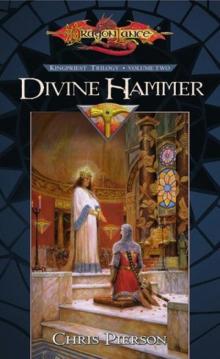 Divine Hammer
Divine Hammer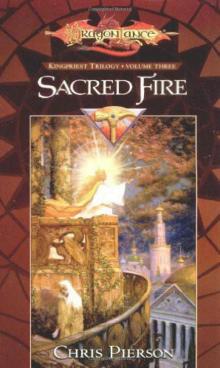 Sacred Fire
Sacred Fire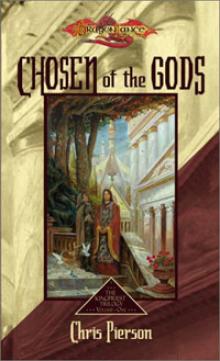 Chosen of the Gods k-1
Chosen of the Gods k-1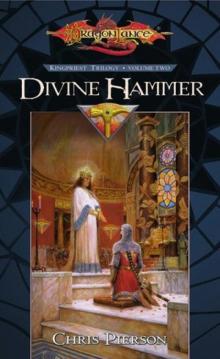 Divine Hammer k-2
Divine Hammer k-2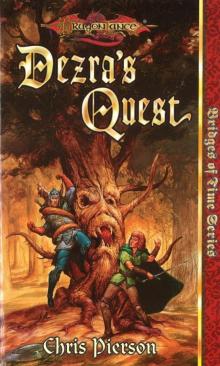 Dezra's Quest
Dezra's Quest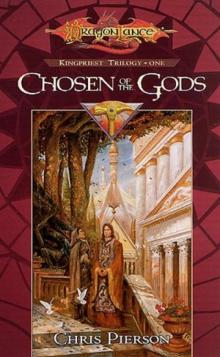 Chosen of the Gods
Chosen of the Gods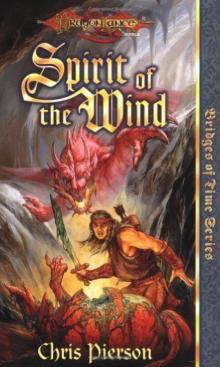 Spirit of the Wind bot-1
Spirit of the Wind bot-1